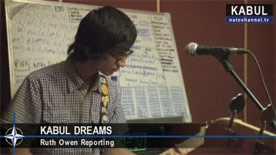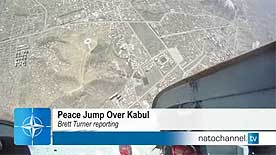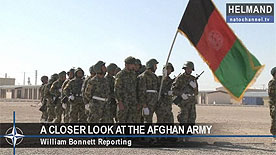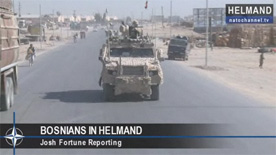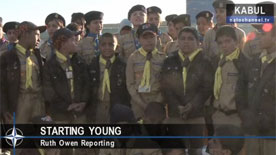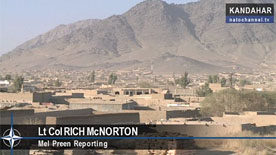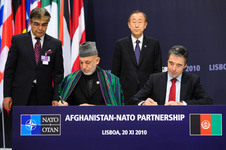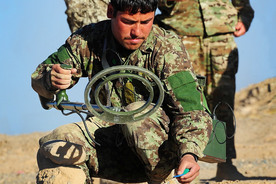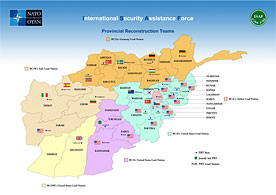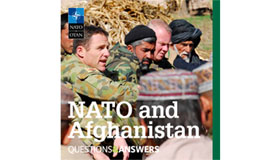NATO and Afghanistan
Video
Background information
Official texts
-
Chicago Summit Declaration on Afghanistan Issued by the Heads of State and Government of Afghanistan and Nations contributing to the NATO-led International Security Assistance Force (ISAF)
21 May. 2012 - UN Security Council Resolution 1974 (2011) - 22 March 2011 (PDF/99Kb)
-
Declaration by the North Atlantic Treaty Organisation (NATO) and the Government of the Islamic Republic of Afghanistan on an Enduring Partnership signed at the NATO Summit in Lisbon, Portugal
20 Nov. 2010 -
Declaration by the Heads of State and Government of the Nations contributing to the UN-mandated, NATO-led International Security Assistance Force (ISAF) in Afghanistan
20 Nov. 2010 -
NATO Nations Approve Civilian Casualty Guidelines
06 Aug. 2010 - UN Security Council Resolution 1917 (2010) - 22 March 2010 (PDF/65Kb)
- UN Security Council Resolution 1890 (2009) - 8 October 2009 (PDF/166Kb)
- UN Security Council Resolution 1833 (2008) - 22 September 2008 (PDF/35Kb)
- UN Security Council Resolution 1817 (2008) - 11 June 2008 (PDF/39Kb)
- UN Security Council Resolution 1776 (2007) - 19 September 2007 (PDF/32Kb)
- UN Security Council Resolution 1707 (2006) - 12 September 2006 (PDF/28Kb)
- UN Security Council Resolution 1623 (2005) - 13 September 2005 (PDF/27Kb)
- UN Security Council Resolution 1563 (2004) - 17 September 2004 (PDF/25Kb)
- UN Security Council Resolution 1510 (2003) - 13 October 2003 (PDF/24Kb)
- UN Security Council Resolution 1444 (2002) - 27 November 2002 (PDF/22Kb)
- UN Security Council Resolution 1413 (2002) - 23 May 2002 (PDF/22Kb)
- UN Security Council Resolution 1386 (2001) - 20 December 2001 (PDF/101Kb)
Opinions
-
Press briefing by the Commander of NATO's Training mission in Afghanistan, Lieutenant General William Caldwell - 23 Feb 2011
23 Feb. 2011 -
''Afghanistan: The 2011-14 Campaign'' - Speech by Amb. Mark Sedwill, NATO's Senior Civilian Representative for Afghanistan, at the Institute for International Affairs, Helsinki
27 Jan. 2011 -
Statement by the NATO Secretary General on the United States Review on Afghanistan and Pakistan
16 Dec. 2010 -
Opening statement by NATO Secretary General Anders Fogh Rasmussen at meeting on Afghanistan with Heads of State and Government
20 Nov. 2010 - ''No Trainers? No Transition'' - LTG Bill Caldwell outlines why he sees trainers as holding the key to Afghanistan’s future (NATO Review 2010)
-
NATO Secretary General welcomes Canadian decision on Afghan mission
16 Nov. 2010 - ''Law, order and the elections in Afghanistan'' (NATO Review 2009)
- Afghanistan (part 1): the Issues (NATO Review 2008)
Last updated: 17-Oct-2012 12:02
Newsroom
- NATO Secretary General congratulates the new Commander of ISAF
-
NATO Secretary General welcomes Afghan transition announcement
31 Dec. 2012

I welcome President Karzai’s announcement of the fourth group of Afghan provinces, cities and districts to undergo transition in the coming months. With this decision, the Afghan security forces will be taking the lead for security for 87% of the Afghan population and 23 of the 34 Afghan provinces.

- Afghan National Army teach counter explosives course for first time
ISAF - Numbers & Figures
Topics
Links
- ISAF - Website of the International Security Assistance Force
- NATO Training Mission - Afghanistan
- United Nations Assistance Mission in Afghanistan (UNAMA)




